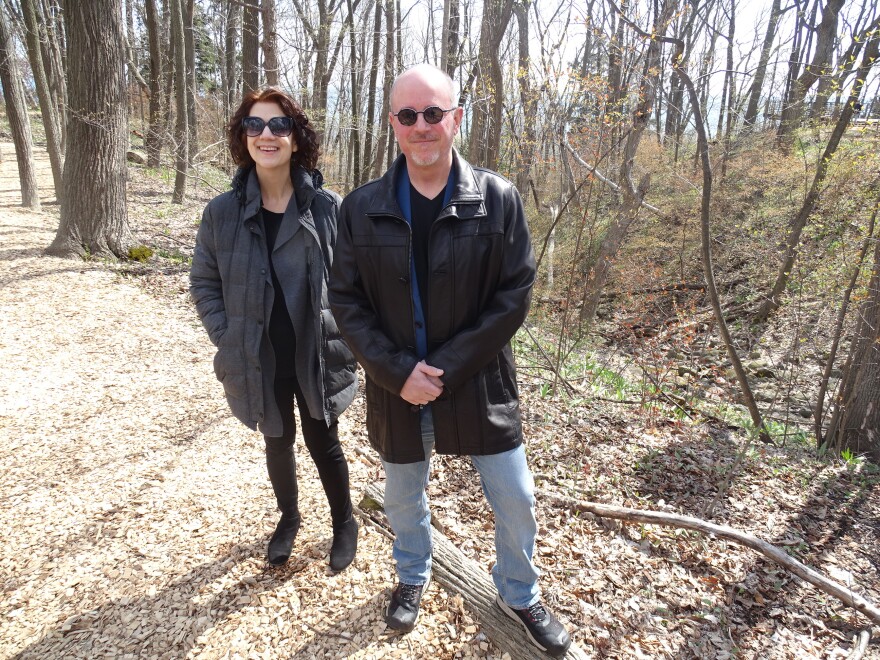In 1992 wildlife biologist David Allen came to Green Bay to help orchestrate the removal of chemicals from the Fox River. Journalist Susan Campbell was also in Green Bay covering the complex story.
It took years of negotiations, followed by a 17-year clean up that cost over a billion dollars. But the effort was ultimately a success.
Allen and Campbell new book Paper Valley — The Fight For The Fox River Cleanup chronicles the story.
Allen says the problem started with what seemed like a great new product back in the 1950s.
"NCR paper company invented a new kind of paper called NCR Paper, like carbon copy paper but without carbon. The problem with this invention was the stuff they used to transfer the ink between the different layers, it had PCBs in it. The trimmings of this paper and the rejected sheets got recycled and the mills on the Fox River learned to practice that recycling," Allen says.
The practice resulted in PCBs being discharged into the Fox River, both by the NCR's manufacturer and by the people who recycled the material.
"It resulted in uncontrolled discharges of PCBs into the river. It accumulated in the sediments for decades and they were still in there all the way to the 90s," Allen says.
Allen and others thought a federal law called the Superfund Law could help solve the problem.
"It’s the law that lots of people have heard of, where you clean up landfills and things like that. But it also can be used to clean up very big sites like rivers, and in the the early 1990s, the Fish and Wildlife Service decided they would partner with Wisconsin ... to do what's called a natural resource damage assessment," says Allen.
So in 1992 U.S. Fish and Wildlife Service sent Allen to Green Bay to help facilitate a clean up.
"So, my job was ... to help Wisconsin build an overall Superfund case would include both the clean up and all of their natural resources and together we would figure out how to do this," says Allen.
Journalist Susan Campbell came on the scene as a new reporter for the Green Bay Press-Gazette.
"The paper saw the Fox River case was ... starting to gather steam. And so they actually resurrected the environment beat (and) asked me if I would take over, which I was very excited about because I've been trying to angle toward science and health reporting before I had come to Green Bay," Campbell says.
Campbell says at first it was a lot to take in. "You know all the acronyms, RIFS, PCBs, what the heck was all this? I was pretty overwhelmed," but says the case was also fascinating, "because I was sitting ringside to the evolving science about PCBs. We were coming out of the times where people could see and smell and taste pollution in the water and in the air and here was this invisible contaminant that people were trying to figure out," says Campbell.
One thing was clear, the PCB situation had to be addressed.
"It had to either come out of the water or be contained in it somehow," Campbell says.
Allen says there were two kinds of complexity at play — administrative and scientific.
"So, let me talk about the scientific one first. So, PCBs are not one thing, they are 209 specific chemicals, and each of those 209 chemicals do different things when they get inside organisms and these things last forever. Not forever, but for decades and decades," says Allen. "They bioaccumulate into organisms and then they cause all these subtle effects because each of these 209 things interferes with enzyme systems and genetic systems. And you get all kinds of injuries, cancer and reproductive failure and deformities."
Administratively, the case was complex, Allen says because it was going to cost a lot of money to fix it, $1.3 billion as it turned out.
Allen says no one, no company would want to pay that price.
"We believed right at the beginning that this was going to require court mandates in order to compel the private sector to pay this much money, and we didn't know exactly how much it was going to be, but we knew it was going to be at least hundreds of millions," says Allen.
The discussion turned into a battle and then went to court before a solution was struck.
Then Gov. Tommy Thompson did not want federal environmental agencies to get involved.
Allen says the Wisconsin Department of Natural Resources supported the Governor's position.
"They went further than not crossing him, they actually championed what he wanted to have happen, which was keep Superfund out," Allen says. "So we ended up in this very, very difficult interagency battle."
The case did finally end up in court. "It went to the appellate court three times, it went to a bench trial, it was a huge amount litigation," Allen says.
He calls the resulting clean up brilliant.
"6.5 million cubic yards, enough to fill up Lambeau Stadium six time, was taken out of that river; a thousand acres of capping, " Allen add. "It's the largest river clean up in the world, the largest PCB clean up in the country. It's one of the biggest Superfund projects ever.
Allen and Campbell says they wrote the book to demonstrat people have a voice and can prevail in daunting situations.
"We face a lot of intractable environmental issues, we're always being told they're too big, they're too expensive, there's no political will, there's no public support and people saying this could never be done, and it was done," Campbell says.
As for Allen, "I think that ordinary citizens and ordinary civil servants anywhere have the capability of sifting through all the heated disputes and all the information and all the conflicting opinions and to make sense of it. Follow where the facts lead and to ignore the bellicose arguments from political ideologues and I think it doesn't matter if it's environmental or even something else."
Susan Campbell and P. David Allen will be at Boswell Books on April 27, 2023 at 6:30 p.m. to talk more about Paper Valley — The Fight For The Fox River Cleanup.







